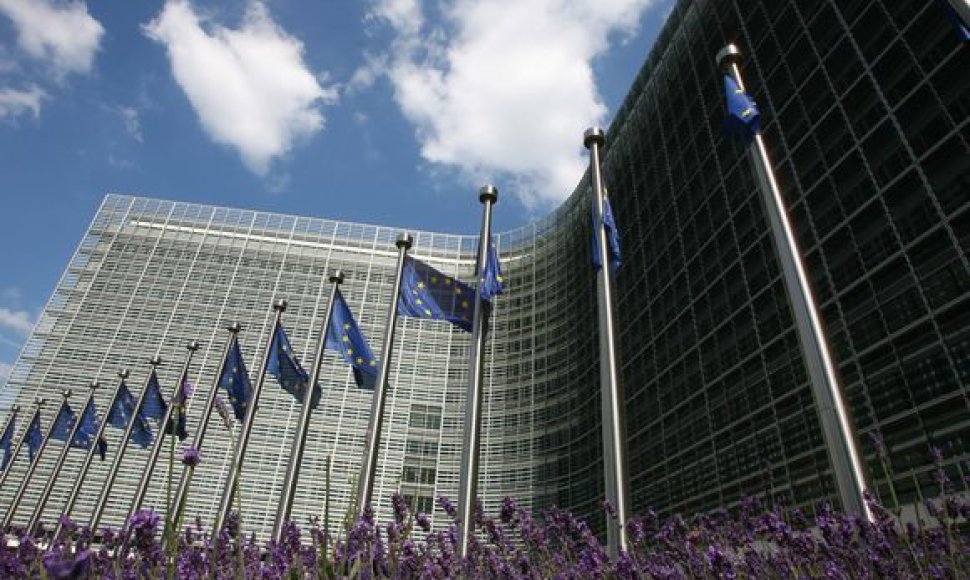"In the wake of our probe, the European Commission notified us there had been a poster competition, which was co-financed by the commission. EC officials promised us it would be taken down," Arūnas Vinčiūnas, ambassador-at-large at Lithuania's permanent mission at the European Union (EU), told BNS on Monday.
In his words, the poster was hanging in the main offices of the EC, Berlaymont. A photograph published in the British media last week reveals that the hammer and sickle was palced next to Christian, Islamic, Judaic and other religious symbols, which formed a five-pointed star.
"I see one interesting thing. If the poster is hanging and it looks like a big five-pointed star from a distance, it raises no concern. And if one comes closer and starts looking into details, then some concern might arise. It's just very interesting psychologically and politically. The large five-pointed start itself seems to have not raised any concern," Lithuanian MEP and former head of state, Vytautas Landsbergis, told BNS on Monday.
His fellow MEP Radvilė Morkūnaitė-Mikulėnienė told BNS the European Commission should have paid more attention, and the incident itself demonstrated that Europe still lacked knowledge of Eastern European history.
"Such posters with such symbols only add to the position that Communist crimes need to be evaluated, and Europe needs to learn more about what has been happening in that part of Europe for 50 years, and that not everyone entered a new stage in 1945 as others were occupied for long decades. The main problem is the lack of knowledge of history. I wouldn’t want to believe that it’s provocation or some evil things," the MEP said.
"The European Commission knows that the symbol – the hammer and sickle – is banned in some EU member states and should pay more attention," she added.
Another Lithuanian MEP, Leonidas Donskis, representing Lithuania's Liberal Movement, said the poster was unacceptable and insulting to Eastern Europe.
"In this case, we need patience and we need to tell them that it's improper and unacceptable. Other signs [in the poster] are real almost thousand-year-old religious symbols. The hammer and sickle is a modern sign. Secondly, it is related to a violence-based ideology and not atheistic belief. Thirdly, it symbolizes pain of Central and Eastern Europe. To do such things means to ignore a tragic experience of a large part of Europe," Donskis told BNS. "We need to say very patiently that it's improper, that should not happen and that such things do not improve Europe's image. It’s something between ignorance, total ignorance, stupidity, and a willful gesture," he said.
Meanwhile Lithuania's Ministry of Foreign Affairs refused to comment.
EC officials promise to look into the details of appearance of the poster.
"The European Commission has condemned crimes of totalitarian regimes. The European Commission's Europe for Citizens Programme funds projects of commemoration of victims of Nazism and Stalinism. The European Commission did not publish the poster," Giedrius Sudikas of the European Commission Representation in Lithuania told BNS.
Meanwhile British MEP Daniel Hannan published a photo of the poster in his blog on the Daily Telegraph website on Friday, showing the hammer and sickle alongside symbols of Christianity, Judaism, and other religions. They form a five-pointed start above slogan "We can all share the same start. EUROPE4ALL."
“For three generations, the badge of the Soviet revolution meant poverty, slavery, torture and death,” he wrote in the Telegraph.
“It adorned the caps of the chekas who came in the night. It opened and closed the propaganda films which hid the famines. It advertised the people’s courts where victims of purges and show-trials were condemned. It fluttered over the re-education camps and the gulags. For hundreds of millions of Europeans, it was a symbol of foreign occupation,” Hannan continued.
The Lithuanian Penal Code stipulates a prison term of up to two years for the denial or gross minimization or public approval of crimes committed by the Soviet Union or Nazi Germany. A Lithuanian law prohibits distribution and demonstration of Nazi and Soviet symbols. Offenders face a fine of LTL 500-1,000 (EUR 145-289).
Those denying Nazi and Communist crimes also face punishment in the Czech Republic, Poland, and Hungary.
The European Commission said in December 2010 it saw no pre-conditions for initiating a document introducing a pan-European ban on denial or gross minimization of Soviet and Nazi crimes.












